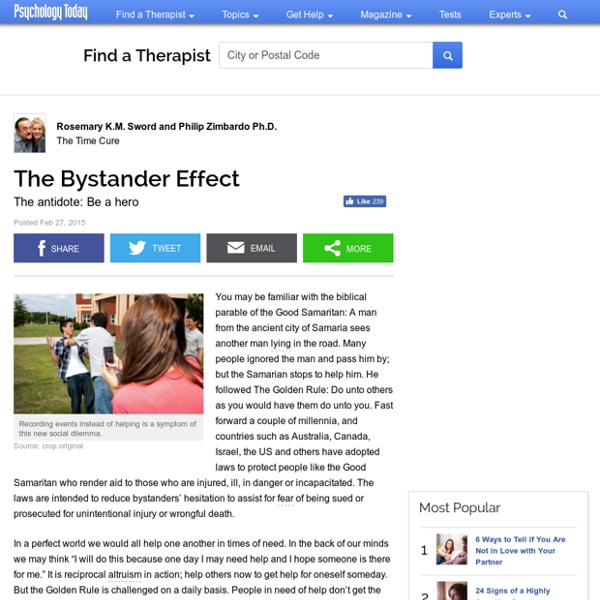



How Diffusion of Responsibility Affects People Diffusion of responsibility is a psychological phenomenon in which people are less likely to take action when in the presence of a large group of people.1 For example, imagine that you are in a large city on a bustling street. You notice a man fall to the ground and start convulsing as if having a seizure. Many people turn and look at the man, but no one moves to help or call for medical assistance. Why? This situation is often used to explain the bystander effect, which suggests that the greater the number of people present, the less likely people are to help a person in distress. Darley and Latané on Diffusion of Responsibility In a series of classic experiments conducted in the late 1960s, researchers John Darley and Bibb Latané asked participants to fill out questionnaires in a room which suddenly began to fill with smoke.2 In one scenario the subjects of the experiment were alone when the smoke entered the room. Factors That Influence Diffusion of Responsibility
What is the Bystander Effect? Bystander Intervention - The Challenge – CSB/SJU CSB and SJU describe themselves as communities that are caring, hospitable, and welcoming. Whether that is real or not is dependent on our actions and behaviors, as well as how we react and intervene in problematic situations. Even in these communities, we have language, attitudes, actions, and behaviors that can lead to or possibly cause problematic, if not dangerous situations. To truly be campuses with healthy and caring attitudes and practices and have a culture that is civil, respectful and non-violent, we need to have community members who are ready, willing and able to intervene in inappropriate, high risk or problematic situations. Engaging community members in intervening is the goal of bystander intervention programs. Bystander Effect Much research on bystanders has examined why some bystanders remain passive and there is even a popular term for such passivity, namely the "bystander effect." Bystander Intervention Pro-Social, Helping Behavior
How can we counteract the Bystander Effect? What Is the Bystander Effect? What Is the Meaning of Bystander Effect? The bystander effect, also known as bystander apathy, refers to a phenomenon in which the greater the number of people there are present, the less likely people are to help a person in distress. If you witnessed an emergency happening right before your eyes, you would certainly take some sort of action to help the person in trouble, right? While we might all like to believe that this is true, psychologists suggest that whether or not you intervene might depend upon the number of other witnesses present. How the Bystander Effect Works When an emergency situation occurs, the bystander effects holds that observers are more likely to take action if there are few or no other witnesses. Being part of a large crowd makes it so no single person has to take responsibility for an action (or inaction). As the participants sat filling out questionnaires, smoke began to fill the room. What Is a Real-Life Example of the Bystander Effect? Why Does It Happen?
Pluralistic Ignorance (SOCIAL PSYCHOLOGY) - iResearchNet Pluralistic Ignorance Definition Pluralistic ignorance occurs when people erroneously infer that they feel differently from their peers, even though they are behaving similarly. As one example, imagine the following scenario: You are sitting in a large lecture hall listening to an especially complicated lecture. After many minutes of incomprehensible material, the lecturer pauses and asks if there are any questions. No hands go up. You look around the room. Another case of pluralistic ignorance that is familiar to many college students concerns drinking on campus. Pluralistic Ignorance and Social Dynamics Pluralistic ignorance plays a role in many other dysfunctional social dynamics. Pluralistic Ignorance and Social Norms Pluralistic ignorance begins with widespread conformity to social norms—norms that govern appropriate behavior in the classroom, at a party, in a boardroom, or in a hospital; norms that regulate behavior with friends, strangers, or colleagues. References: O’Gorman, H.
Diffusion of Responsibility Pluralistic Ignorance Online source on How to Overcome the Bystander Effect Psychologists have long been interested in exactly why and when we help other people. There has also been a tremendous amount of interest in the reasons why we sometimes don't help others. The bystander effect is a social phenomenon that occurs when people fail to help those in need due to the presence of other people. While the bystander effect can have a negative impact on prosocial behavior, altruism and heroism, researchers have identified a number of different factors that can help people overcome this tendency and increase the likelihood that they will engage in helping behaviors.2 Some of these include: Witnessing Helping Behavior Sometimes just seeing other people doing something kind or helpful makes us more willing to help others. Imagine that you are walking into a large department store. Researchers have found that when we observe other people engaging in prosocial behaviors, such as donating blood, we are more likely to do the same, according to a study published in 2019.3